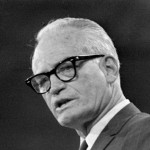When a pundit wants to highlight a candidate’s nuttiness or “extremism,” the go-to comparison is Barry Goldwater. Now Goldwater’s failed 1964 campaign is the analogy du jour for Ted Cruz. But such comparisons get Goldwater terribly wrong.
Goldwater’s positions were radically for his day. He was a dyed-in-the-wool, no-holds-barred, small government, Cold War hawk who was ideologically closer to Herbert Hoover than to Dwight Eisenhower. His extremism likely did cost him votes in the general election. But any Republican candidate would have been clobbered by Lyndon Johnson that year.
What pundits miss in focusing on ideology is another crucial dimension of political behavior: the contrast between what I call “organization men” and “evangelical ideologues.” Goldwater was an organization man. Fundamentally, the approached politics as an organizational challenge. If you wanted to win, you had to form alliances with those who could enhance your own strength. You had to compromise. You had to cultivate relationships with your fellow party members and office-holders. You can see evidence of this in his city council campaigns, his work to build the Arizona Republican Party, and his two terms as Chairman of the National Republican Senatorial Committee (NRSC), the campaign wing of the Republican senatorial caucus. It’s especially clear in his relationship with John F. Kennedy – a man who was his political enemy on almost every front but with whom he shared a trusting friendship.
Goldwater’s political adversaries within the party were the evangelical ideologues. They though of politics as akin to missionary work. If you wanted to win, you had to help people see that your ideas were right. The only way to do so convincingly was to be as politically pure as possible all the time. Compromise would only dilute the message, making it harder for the ‘real’ Americans to recognize the truth of conservatism and change the error of their ways. These men weren’t always evangelical Christians, though I see the roots of this conception of politics in the religious turn in Cold War anti-communism. For those familiar with Arizona, these men included Evan Mecham and John Conlan. On the national stage, this included Jerry Falwell, with whom Goldwater sparred regarding Sandra Day O’Connor’s nomination to the Supreme Court.
Cruz is certainly an evangelical ideologue. The 2013 shutdown, the battle over Homeland Security funding, and his general disinterest in both governing and making friendships within his own party all serve as evidence. As Chairman of the NRSC, Goldwater spend four years traveling around the nation campaigning for all Republican senatorial candidates – liberals, moderates, and conservatives. Can you imagine Ted Cruz doing that? Goldwater’s nomination in 1964 may have been an unset of sorts, but he was building on a base of goodwill within the party. Whatever his stands on policy, it’s that lack of goodwill – his failure to attend to the organizational side of politics – that will ultimately doom Cruz’s campaign.
Latest posts by Jason LaBau (see all)
- Take Down the Confederate Monuments - August 14, 2017
- The Democratic Split - August 10, 2015
- On Lincoln and Our Second Founding - July 6, 2015

